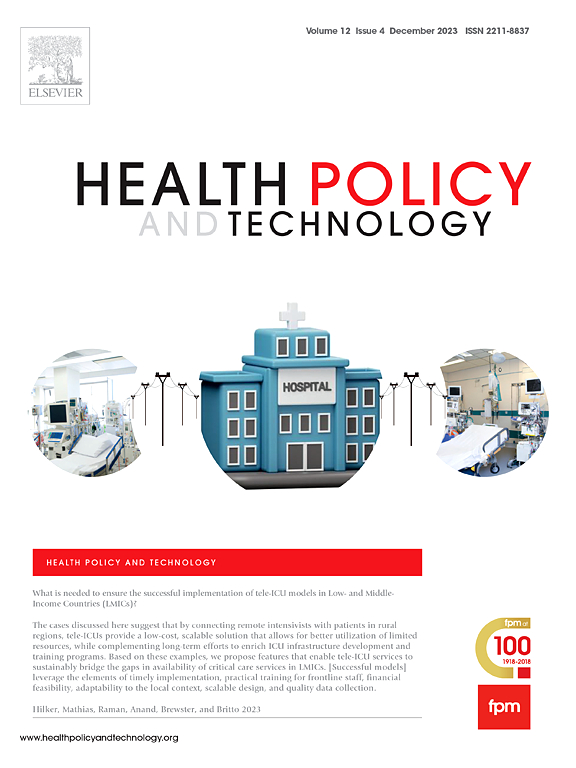Evaluating mobile health interventions for HIV patients in Nigeria: Healthcare policy implications from a simulation study
IF 3.4
3区 医学
Q1 HEALTH POLICY & SERVICES
引用次数: 0
Abstract
Objectives
People living with HIV/AIDS (PLWHA) benefit from mobile health (mHealth) technologies through self-managing and monitoring their disease with enhanced patient experience and health outcomes. However, the efficiency and cost-effectiveness of these interventions are yet to be studied. The study aims to assess the impact of mHealth on operational and cost metrics relevant to PLWHA and HIV service delivery.
Data Sources
Data were a mixture of primary and secondary data from the hospital setting, experts’ opinions, reports, and the literature.
Method
Using a web-based simulation platform, SmartHIV Manager™, for the management of HIV services, we tested scenarios based on four possible reductions in the number of clinic visits and four groups of PLWHA who can be offered a mobile device free of charge (16 scenarios in total). The study was conducted in collaboration with Faith Alive Foundation Hospital (Nigeria) using a mHealth app (BSmart Chart).
Results
In the worst-case scenario, the hospital anticipates a 14 % decrease in the number of visits from stable patients, nine fewer doctors to operate their service, and a 3 % savings in total cost after accounting for mHealth intervention expenses and mobile phone acquisition. With the service currently running at 161 % doctor capacity, this intervention alleviates staff pressure and ensures quality care.
Conclusion
The study shows significant system efficiency gains, fewer visits, better health outcomes, economic benefits for stable patients, and increased capacity. These findings apply to most HIV services worldwide, especially in times of limited resources.
Public Interest Summary
Mobile health (mHealth) technologies support people living with HIV/AIDS by helping them manage their health and receive remote monitoring. This study examines the impact of mHealth apps on the costs and operations of HIV services. Conducted in a rural HIV setting in Nigeria, where many patients face financial challenges, the research used a simulation-based decision support tool (known as SmartHIV Manager) to test the scenario of providing free mobile devices and reducing clinic visits for stable patients. Results indicated that this approach could reduce patient visits and healthcare costs while easing the workload of overburdened doctors. Globally, introducing mHealth apps could be impactful, given the constraints of limited healthcare staff and budgets.
评估针对尼日利亚艾滋病患者的移动医疗干预措施:模拟研究对医疗政策的影响
目标艾滋病毒/艾滋病感染者(PLWHA)通过自我管理和监测疾病,从移动医疗(mHealth)技术中获益,从而改善患者的就医体验和健康状况。然而,这些干预措施的效率和成本效益还有待研究。本研究旨在评估移动医疗对 PLWHA 和 HIV 服务提供相关的运营和成本指标的影响。数据来源数据由医院环境、专家意见、报告和文献中的主要数据和次要数据混合而成。方法我们使用基于网络的模拟平台 SmartHIV Manager™ 来管理 HIV 服务,测试了基于四种可能减少的门诊次数和四组可免费获得移动设备的 PLWHA 的情景(共 16 种情景)。研究是与 Faith Alive Foundation 医院(尼日利亚)合作进行的,使用的是移动医疗应用程序(BSmart Chart)。结果在最坏的情况下,医院预计稳定期患者的就诊人数将减少 14%,运营服务的医生人数将减少 9 人,在计入移动医疗干预费用和手机购置费用后,总成本将节省 3%。该研究表明,系统效率显著提高、就诊人数减少、健康状况改善、稳定期患者获得经济收益以及服务能力提高。这些发现适用于全球大多数艾滋病服务机构,尤其是在资源有限的情况下。公益摘要移动医疗(mHealth)技术通过帮助艾滋病毒/艾滋病感染者管理健康和接受远程监控,为他们提供支持。本研究探讨了移动医疗应用程序对艾滋病服务成本和运营的影响。研究在尼日利亚的一个农村艾滋病环境中进行,那里的许多患者都面临着经济困难,研究使用了一种基于模拟的决策支持工具(称为 SmartHIV Manager)来测试提供免费移动设备和减少稳定期患者就诊次数的方案。结果表明,这种方法可以减少患者就诊次数,降低医疗成本,同时减轻不堪重负的医生的工作量。在全球范围内,由于医疗保健人员和预算有限,引入移动医疗应用程序可能会产生影响。
本文章由计算机程序翻译,如有差异,请以英文原文为准。
求助全文
约1分钟内获得全文
求助全文
来源期刊

Health Policy and Technology
Medicine-Health Policy
CiteScore
9.20
自引率
3.30%
发文量
78
审稿时长
88 days
期刊介绍:
Health Policy and Technology (HPT), is the official journal of the Fellowship of Postgraduate Medicine (FPM), a cross-disciplinary journal, which focuses on past, present and future health policy and the role of technology in clinical and non-clinical national and international health environments.
HPT provides a further excellent way for the FPM to continue to make important national and international contributions to development of policy and practice within medicine and related disciplines. The aim of HPT is to publish relevant, timely and accessible articles and commentaries to support policy-makers, health professionals, health technology providers, patient groups and academia interested in health policy and technology.
Topics covered by HPT will include:
- Health technology, including drug discovery, diagnostics, medicines, devices, therapeutic delivery and eHealth systems
- Cross-national comparisons on health policy using evidence-based approaches
- National studies on health policy to determine the outcomes of technology-driven initiatives
- Cross-border eHealth including health tourism
- The digital divide in mobility, access and affordability of healthcare
- Health technology assessment (HTA) methods and tools for evaluating the effectiveness of clinical and non-clinical health technologies
- Health and eHealth indicators and benchmarks (measure/metrics) for understanding the adoption and diffusion of health technologies
- Health and eHealth models and frameworks to support policy-makers and other stakeholders in decision-making
- Stakeholder engagement with health technologies (clinical and patient/citizen buy-in)
- Regulation and health economics
 求助内容:
求助内容: 应助结果提醒方式:
应助结果提醒方式:


